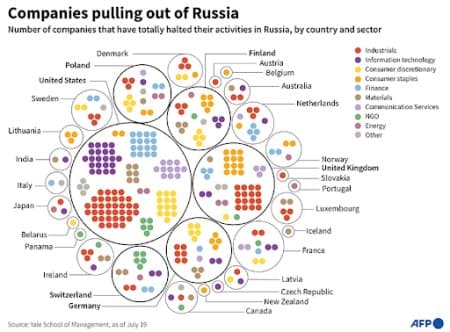Since Russia’s invasion of Ukraine On February 24, 2022, multinational companies have come under intense pressure from investors and consumers to exit operations, sell businesses or write down their investments in Russia. Shortly thereafter, Jeffrey Sonnenfeld, professor at Yale University’s School of Management, created a global list of foreign companies that trade in Russia. Sonnenfeld’s list assigns grades to nearly 1,400 companies, from an A for complete withdrawal to an F for what he calls “digging in.” His comprehensive directory has managed to become a cudgel against companies that have stubbornly held fast, and made Sonnenfeld persona non grata in Russia after being added to the country’s ‘Stop List’ alongside 24 other American policymakers including Jill Biden and Mitch McConnell

Source: Yale Chief Executive Leadership Institute
Sonnenfeld has told Bloomberg that he noticed an unusual pattern as U.S. businesses started withdrawing from Russia: the first movers actually were oil giants with complex local ties and huge sunk costs; and tech companies wary of the political complications and professional firms that hate to offend their clients rather than consumer brands sensitive to public sentiment. He says he learned that professional and tech companies responded to employee pressure to take a stand over concerns about social responsibility while oil company leaders could see starkly how their business would directly fund Putin’s war.
Sonnenfeld’s advocacy has clearly borne fruit: 200 companies exited Russia less than a week after he posted the first version of his list online in early March. So far, only 6.1% of American companies have carried on with business as usual while 28.7% have completely halted operations.
What About the Oil?
BP has been called out for what some view as its insincerity, but research into its ties to Rosneft from a media perspective are lacking. Reports criticizing BP offer no concrete evidence to support accusations.
Related: Suncor Colorado Refinery Shut Down Until March
Last month, Oleg Ustenko, an advisor to Ukrainian President Volodymyr Zelensky, called BP’s stake in Russia’s state-run oil giant Rosneft “blood money”. He even penned a letter to BP CEO Bernard Looney, accusing the company of making hundreds of millions of dollars via its stake in Rosneft.
So what happened here?
Just days after Russia launched its invasion of Ukraine, BP announced that it would exit its 19.75% stake in Rosneft. But that exit is still not complete, 10 months later.
In Q4 2022, when Rosneft announced it would pay a 9-month dividend of what amounts to some $3.6 billion, some sources suggested that BP would net over $706 million as a result.
A new report by the Moral Rating Agency (MRA), accuses BP (along with HSBC Holdings and Unilever) of having failed to properly exit Russia, using “loopholes” in international sanctions to continue operating there.
According to BP, however, while the company is aware of Rosneft’s payment of dividends, BP “has not received any payments since its decision of 27 February [to exit its stake]. It has no expectations of receiving any in the future”.
And while BP has not managed to complete its exit from Rosneft, the company notes that it “continues to actively pursue the disposal of its shareholding in Rosneft”.
“The process is complex due to both international sanctions and Russian regulations. bp is actively engaged in marketing the asset, but its ability to sell is constrained by Russian legislation and the Russian government, who have effective approval rights on any buyer, as well as by limitations resulting from international sanctions. It was anticipated that this would be – and it is proving to be – a drawn-out process,” BP noted in a statement on its website.
The bottom line is that the damage was already done and it is no longer relevant to talk about the details of BP’s exit–or others. Big oil funded Putin’s invasion of Ukraine, of course. Oil and gas revenues earned Putin’s regime some $100 billion since 2014.
It’s pointless now to discuss who has pulled out and who hasn’t. However, when it comes to big oil–they were the first to jump ship at the start of the invasion, when they all chimed in, in unity:
“This military action represents a fundamental change,” BP Chair Helge Lund stated. “It has led the BP board to conclude, after a thorough process, that our involvement with Rosneft, a state-owned enterprise, simply cannot continue.”
“We are shocked by the loss of life in Ukraine, which we deplore, resulting from a senseless act of military aggression which threatens European security,’ Ben van Beurden, Shell’s chief executive, said. ‘We cannot – and we will not – stand by.’
By Alex Kimani for Oilprice.com
More Top Reads From Oilprice.com:
- The 10 Most Influential Figures In The History Of Oil
- The Oil Market Crisis Sparked By Russia’s Invasion Is Nearing Its End
- Russian Crude Oil Exports Plummeted At The End Of 2022



















Whatever the case, Russia isn’t unhappy about BP exiting the country since it can get BP’s share on the cheap. Moreover. Russia neither needs BP’s technology nor its investments. It has both.
Russia’s huge Vostok Arctic project costing 170 bn dollars is being pursued with Homegrown state-of-the-art-technology and domestic finance. It will add 1.6 million barrels a day (mbd) of Arctic oil to Russian oil production.
Dr Mamdouh G Salameh
International oil economist
Global energy expert